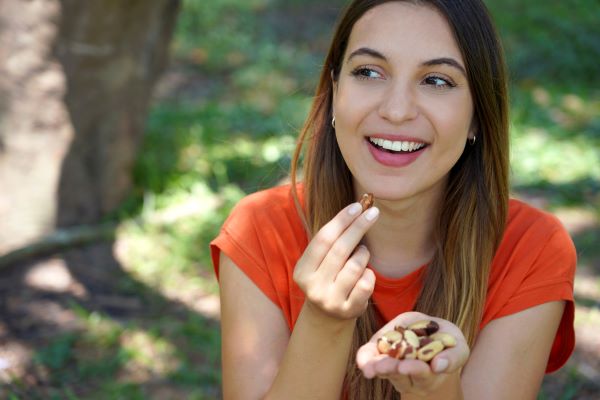-
Good, restful sleep is so important for wellbeing. But there are a whole host of things in our lifestyle and daily habits that impact how quickly and easily we fall asleep, and how rejuvenating our rest actually is.
Food can play a key role in our rhythms of wake and sleep. We talked to sleep physician Professor David Hillman, director of the West Australian Sleep Disorders Research Institute, for some advice on what to eat for a better night’s slumber.
What is the relationship between food and sleep?
Eating, exercising and sleeping are the three cornerstones of a healthy lifestyle. These rituals make up the rhythm of our daily lives – during wakefulness, we eat healthy food regularly and get some exercise and activity, and then overnight we fast and rest. Sensible eating is a good preparation for sleep, and poor eating can interfere with sleep.
The timing of meals is important. Some people like having a snack before bed, and as long as it’s nutritious and easy to digest, there’s nothing wrong with that. However, heavy meals too close to bedtime can disrupt your sleep because of the risk of indigestion.
If you’re eating dinner within a couple of hours of sleep, it’s best to have a small meal, and go for something higher in carbs and lower in fats and proteins. This is because carbs are digested more quickly, while fats and proteins spend a lot longer in the stomach.
If you’re eating earlier in the evening, say four or five hours before bed, then you have a bigger window for digestion before sleep, and the usual guidelines for a healthy diet apply.
What foods can help you sleep?
Foods that contain tryptophan seem to help a bit with sleep. Tryptophan is an amino acid that is a precursor to the production of serotonin, a feel-good hormone. Serotonin is a step along the way to the production of melatonin, a hormone of the night that can help you sleep.
Milk products have a bit of tryptophan in them, so a nice glass of warm milk before bedtime is some people’s ritual. Nuts and pulses (like almonds, walnuts and chickpeas), poultry, shellfish and bananas also contain a bit of tryptophan. These foods are also quite easily digested, so they can be good to eat at night.
There aren’t too many foods that actually have melatonin in them directly, but cherries are of one of them.
How late in the day should you stop drinking coffee?
Most people have it worked out – coffee can be great in the morning, but not so good in the afternoon. As a really general rule, early afternoon is probably the latest you should be drinking coffee. Caffeine is a stimulant, so it can obviously disrupt your sleep. The amount of caffeine in coffee varies, from around 80 mg in instant coffee, to up to 300-400 mg in a double or triple shot espresso.
Remember that there’s caffeine in a lot of other things too. A strong cup of tea has a moderate amount of caffeine, and so does chocolate. Needless to say, energy drinks and colas all have a fair amount of caffeine too.
Alcohol – good or bad for sleep?
Some people actually use alcohol to get to sleep, and because of its sedative effect, it does help with sleep onset. The trouble is, not long after you’ve gone to sleep the alcohol starts to metabolise, and that’s when it disrupts your sleep. It’s almost like the brain is withdrawing from it.
Another way alcohol can disrupt your sleep is by relaxing your throat muscles. If you have sleep apnoea, alcohol can make that worse. Snoring is often worse after drinking alcohol, and that’s something that causes a bit of complaint in the bedrooms of our great nation.
Find out more about sleeping well at sleephealthfoundation.org.au
Food for sleep

-
How to prevent and treat dental injuries
Specialist dentist Associate Professor William Ha shares some tips on how to keep your teeth safe during sports by wearing a mouthguard.
-
The many benefits of volunteering
When you volunteer, the good doesn't stop there. Research has found that those who give their time for something are usually happier and healthier than those who don’t.
-
Eat for your eyes
Some of our favourite foods to help keep your eyes healthy.
-
How is ‘phubbing’ hurting your relationships?
Here’s how to stop phubbing and be more mindful of your phone habits, to help improve face to face interactions with your family and friends.
-
Are the winter blues real?
Simple ways to boost your mood in winter.
-
Mental fitness explained
Just as you work to strengthen your body, your mental health deserves attention and exercise too.
Subscribe to receive the best from Live Better every week. Healthy recipes, exercise tips and activities, offers and promotions – everything to help you eat, move and feel better.
By clicking sign up I understand and agree to Medibank's privacy policy






